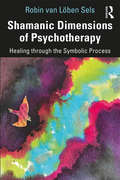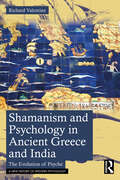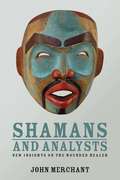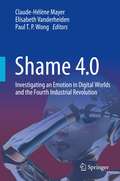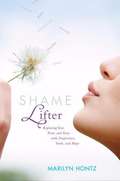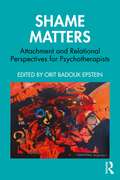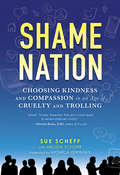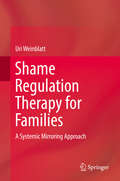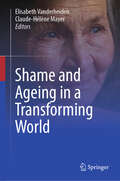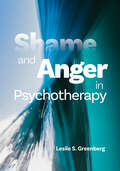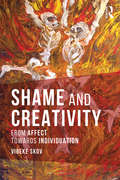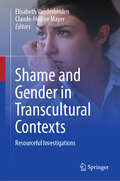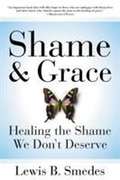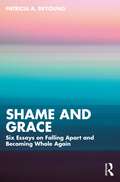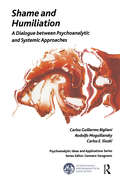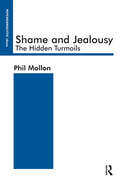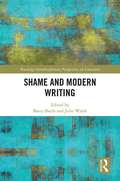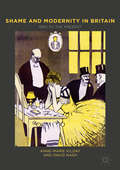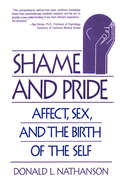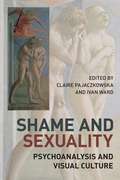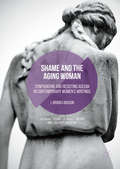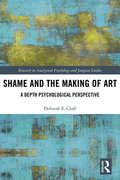- Table View
- List View
Shakespearean Sensations
by Katharine A. Craik Tanya PollardThis strong and timely collection provides fresh insights into how Shakespeare's plays and poems were understood to affect bodies, minds and emotions. Contemporary criticism has had surprisingly little to say about the early modern period's investment in imagining literature's impact on feeling. Shakespearean Sensations brings together scholarship from a range of well-known and new voices to address this fundamental gap. The book includes a comprehensive introduction by Katharine A. Craik and Tanya Pollard and comprises three sections focusing on sensations aroused in the plays; sensations evoked in the playhouse; and sensations found in the imaginative space of the poems. With dedicated essays on Hamlet, Macbeth, Othello and Twelfth Night, the collection explores how seriously early modern writers took their relationship with their audiences and reveals new connections between early modern literary texts and the emotional and physiological experiences of theatregoers.
Shakespeare’s Guide to Hope, Life, and Learning
by Lisa Dickson Shannon Murray Jessica Riddell"What is the most wonderful thing about teaching this play in our classrooms?" Using this question as a starting point, Shakespeare’s Guide to Hope, Life, and Learning presents a conversation between four of Shakespeare’s most popular plays and our modern experience, and between teachers and learners. The book analyzes King Lear, As You Like It, Henry V, and Hamlet, revealing how they help us to appreciate and responsibly interrogate the perspectives of others. Award-winning teachers Lisa Dickson, Shannon Murray, and Jessica Riddell explore a diversity of genres – tragedy, history, and comedy – with distinct perspectives from their own lived experiences. They carry on lively conversations in the margins of each essay, mirroring the kind of open, ongoing, and collaborative thinking that Shakespeare inspires. The book is informed by ideas of social justice and transformation, articulated by such thinkers as Paulo Freire, Parker J. Palmer, Ira Shor, John D. Caputo, and bell hooks. Shakespeare’s Guide to Hope, Life, and Learning advocates for a critical hope that arises from classroom experiences and moves into the world at large.
Shamanic Dimensions of Psychotherapy: Healing through the Symbolic Process
by Robin van Löben SelsIn Shamanic Dimensions of Psychotherapy: Healing through the Symbolic Process, Robin van Löben Sels uniquely and honestly recounts her personal journey toward a shamanic understanding of psychotherapy. Exploring the disruptive breakthrough of visions and dreams that occurred during her analysis, personal life, and psychoanalytic training, van Löben Sels illustrates how the phenomenology of ancient shamanism is still alive and how it is a paradigm for the emergence and maturation of the psyche in people today. This original book delves into van Löben Sels’s personal experience of the shaman, identifying such eruptions as a contemporary version of the archaic shaman’s initiatory call to vocation. The book is split into two parts. It begins by outlining the shamanic personality in history, recognizing this as an individual that has been called out of a collectively sanctioned identity into a creative life, and the unconscious shaman complex they consequently face, especially in psychotherapeutic relationships. Practical as well as theoretical, the second part outlines the shamanic attributes that underline psychotherapeutic relationships - silence, sound, mask, rhythm, gesture, movement, and respiration - and usefully describes how to use them as asanas for consciousness, or vehicles toward psychological awareness. With clinical examples and personal stories throughout, this book’s unique Jungian perspective addresses contemporary expressions of the shaman complex in our current world. Shamanic Dimensions of Psychotherapy: Healing through the Symbolic Process will be essential reading for Jungian analysts and psychotherapists in practice and in training, as well as for academics and students of Jungian and post-Jungian studies. It will be especially helpful and illuminating to those who have experienced an involuntary plunge into the depths and who seek ways to articulate their experience.
Shamanism and Psychology in Ancient Greece and India: The Evolution of Psyche (A New History of Western Psychology)
by Richard ValentineThis book offers a historical introduction to psychology. It investigates the evolutionary origins of our capacity to practice psychology, including the necessary social conditions and the specialised language involved. It then turns to two cultural containers in which it first emerged, those of ancient Greece and ancient India. This is the second book in a new series, which presents the emergence of Western psychology in a global context.The author begins by building a bridge between evolutionary psychology and the history of psychology. From one side, this bridge is an evolutionary account of human culture. From the other, it is a narrative of human evolution using the latest fossil and genetic evidence. Finally, linguistics and anthropology link the appearance of our species with the emergence of ancient psychologies. Central to this is the role of the shaman-figure in all ancient cultures, which is connected to the origins of psychological language. The key words ‘psyche’ (mind, conscious and unconscious) and ‘logos’ (talk, discourse, reason) will find their permanent meanings in Greece before they are combined to form ‘psychology’ in Plato. Parallel terms in India such as ‘atman’ (the universal self) and ‘manas’ (mind) also find their range of meanings. Ancient Europe and ancient India, two wings of the Indo-European world, are introduced as distinct cultures related by language, each developing distinct psychological traditions. Descriptions and explanations of mental phenomena are traced from Homer to Plato, and in India from the Vedas to the Upanishads. In each case these are related to the competing ‘psychologies’ of religious cults as manifestations of shamanism, leading to the birth of world psychologies. Presented in an accessible manner, this is an excellent resource for students and teachers of psychology, philosophy, history, linguistics, archaeology, and anthropology, as well as general readers who want to learn more about the origins of psychology on a global stage.This title follows on from The Global Origins of Psychology: Neurology, Language and Culture in the Ancient World. It applies the same framework to the Indo-European world.
Shamans and Analysts: New Insights on the Wounded Healer
by John MerchantShamans and Analysts provides a model by which to understand the wounded healer phenomenon. It provides evidence as to how this dynamic arises and gives a theoretical model by which to understand it, as well as practical implications for the way analysts' wounds can be transformed and used in their clinical work. By examining shamanism through the lens of contemporary approaches to archetype theory, this book breaks new ground through specifying the developmental foreground to the shaman archetype, which not only underpins the wounded healer but constitutes those regarded as ‘true Jungians’. Further areas of discussion include: Siberian shamanism contemporary archetype theory countertransference phenomena in psychotherapy socio-cultural applications of psychoanalytic theory. These original and thought-provoking ideas offer a revolutionary way to understand wounded healers, how they operate and how they should be trained, ultimately challenging traditional analyst / analysand stereotypes. As such this book will be of great interest to all Jungians, both in training and practice, as well as psychoanalysts, psychotherapists and counsellors with an interest in the concept of the wounded healer.
Shamans and Robots: On Ritual, the Placebo Effect, and Artificial Consciousness (Univocal)
by Roger BartraA profound exploration of the external influences that shape human consciousness, from healing rituals to digital devices In this voyage through thousands of years of psychosomatic healing, distinguished anthropologist and sociologist Roger Bartra examines the placebo effect as a key to our understanding of human consciousness. Shamans and Robots demonstrates how biology and technology become intertwined within human culture by using the various histories of ritual and symbolic healing to speculate about future developments in artificial intelligence. Charting the extensive history of the placebo effect through medieval healing, shamanism, and early psychoanalytic practices, Bartra posits that consciousness is not simply the province of the mind but something equally shaped by external systems and objects. He finds evidence of this &“exocerebrum&”—the extension of our brains outside the body—in the shamanistic concept of the placebo, in which external objects heal our bodies, and in modern technical devices like prostheses or robots, whose development of a mechanical consciousness would have to mimic, and in turn elucidate, the processes involved in the creation of consciousness in humans. Through this radical concept, he analyzes digital media&’s relationship to the functions of the human brain and probes the possibility of artificial consciousness. Both a look at the human body&’s potential to restore itself and a profound reflection on the curative power of symbolic structures, Shamans and Robots explores how our technologies increasingly serve as extensions of our cognitive selves.
Shame 4.0: Investigating an Emotion in Digital Worlds and the Fourth Industrial Revolution
by Elisabeth Vanderheiden Claude-Hélène Mayer Paul T. P. WongThis edited volume provides new perspectives on how shame is experienced and transformed within digital worlds and Industry 4.0. The editors and authors discuss how individuals and organisations can constructively transform shame at work, in professional and private contexts, and with regard to socio-cultural lifestyle changes, founded in digitalisation and Industry 4.0. The contributions in this volume enable researchers and practitioners alike to unlock the topic of shame and its specifics in the highly dynamic and rapidly changing times to explore this emotion in depth in connection with remote workplaces, home office, automated realities and smart systems, or digitalised life- and working styles. By employing transdisciplinary and transcultural perspectives, the volume further discusses shame in the context of new lifestyles, religion, gender, sexual suppression, mental illness, and the nature of citizenship. Researchers, practitioners and students in the fields of industrial and organisational psychology, positive psychology, organisational studies, future studies, health and occupational science and therapy, emotion sciences, management, leadership and human resources will find the contributions highly topical, insightful and applicable to practice. Fresh, timely, thought-provoking with each turn of the page, this impressive volume explores shame in today’s world. Moving beyond the simple “guilt is good; shame is bad” perspective, authors from diverse disciplines examine adaptive and maladaptive aspects of shame in the context of contemporary issues (e.g., social media use, COVID-19) via multiple cultural and social lenses. Aptly named, Shame 4.0 is a treasure trove of rich ideas ripe for empirical study – a blueprint for the next generation of research on this complex and ubiquitous emotion. Bravo! --June Tangney, PhD, University Professor and Professor of Psychology, George Mason University, USA Uncovering Shame - To a much greater extent than other emotions like anger, grief, and fear, until recently most shame in modern societies has been hidden from sight. The text you see in this book is one of the steps that is being taken to make it more visible and therefore controllable. -- Thomas Scheff, Prof. Emeritus Department of Sociology, UCSB, Santa Bararbara, Ca.
Shame Lifter: Replacing Your Fears and Tears with Forgiveness, Truth, and Hope
by Marilyn HontzDo you ever berate yourself over minor happenings? Do you feel unworthy and wonder why God would love you? Do you struggle to overcome memories of verbal, emotional, or physical abuse? If so, you may be suffering from unhealthy shame which, if not corrected, can produce bitterness and negativity in your life. From the author of the acclaimed book Listening for God comes the life-transforming book Shame Lifter, based on author Marilyn Hontz's personal story of releasing her own shame and embarking instead on a life of freedom, forgiveness, and truth.
Shame Matters: Attachment and Relational Perspectives for Psychotherapists (The Bowlby Centre Monograph Series)
by Orit Badouk EpsteinUnderstanding shame as a relational problem, Shame Matters explores how people, with support, can gradually move away from the relentless cycle of shame and find new and more satisfying ways of relating. Orit Badouk Epstein brings together experts from across the world to explore different aspects of shame from an attachment perspective. The impact of racism and socio-economic factors on the development and experience of shame are discussed and illustrated with clinical narratives. Drawing upon the experience of infant researchers, trauma experts and therapists using somatic interventions, Shame Matters explores and develops understanding of the shameful deflations encountered in the consulting room and describes how new and empowered ways of relating can be nurtured. The book also details attachment-informed research into the experience of shame and outlines how it can be applied to clinical practice. Shame Matters will be an invaluable companion for psychotherapists, clinical psychologists, counsellors, social workers, nurses, and others in the helping professions.
Shame Nation: The Global Epidemic Of Online Hate
by Melissa Schorr Sue Scheff Monica Lewinksy"Engaging, sharp, and important — Shame Nation will inspire you to open your eyes and be better." — Theresa Payton, CEO of Fortalice Solutions and Deputy Director of Intelligence on CBS' HuntedIn today's digitally driven world, disaster is only a click away. A rogue tweet could bring down a business; an army of trolls can run a celebrity off-line; and virtual harassment might cause real psychological damage. Shame Nation is the first book to both study the fascinating phenomenon of online shaming, and offer practical guidance and inspiring advice on how to prevent and protect against cyber blunders and faceless bullies. Author and acclaimed Internet safety expert Sue Scheff unveils all sides of an issue that it only becoming more relevant day by day while drawing from the expertise of other top professionals spanning fields including law, psychology, and reputation management.From damning screenshots to revenge porn, Shame Nation shines a light on the rising trend of an online shame culture and empowers readers to take charge of their digital lives.
Shame Regulation Therapy for Families: A Systemic Mirroring Approach
by Uri WeinblattThis accessible guide introduces systemic mirroring, an innovative approach to understanding and managing the disruptive presence of shame in family therapy. Shame is analyzed in individual and interpersonal contexts, and in two basic problematic states—experiencing too much or too little shame—often found at the root of serious problems between children and their parents. The author offers potent conversation-based strategies for working with children, adolescents, and their families, and for working with parents to resolve their own shame issues so they can improve their relationships with their children. The author also illustrates how shame regulation can improve the bond between client and therapist and produce lasting effects as clients learn to disengage from shame. This practical resource: Offers an innovative approach to dealing with shame in therapy Integrates practical methods for use with children, adolescents, and parents Discusses how shame derails interpersonal communication Provides interventions for shame management and dealing with the state of shamelessness Shows how parents can regulate their own shame at the couple level Applies these methods to school settings Shame Regulation Therapy for Families aides the work of professionals such as psychologists, psychiatrists, social workers, and school psychologists who work with children and their families on shame management.
Shame and Ageing in a Transforming World
by Elisabeth Vanderheiden Claude-Hélène MayerThe book provides a comprehensive overview of research and concepts related to shame and ageing, in the context of social change, upheavals and paradigm shifts, from transdisciplinary, cultural and transcultural perspectives. Drawing upon the editors' previous works on the topic of shame, this volume discusses the contexts of shame and ageing from theoretical, conceptual, and empirical perspectives. The toxic and stressful aspects of shame have been the focus of scientific analysis and discourse on shame and ageing. This volume explicitly makes the dimensions of shame a resource for individuals, and collective transformation processes the object of research in the context of ageing. It looks at emerging lifestyle, political, socio-economic and health contexts. It looks at how and why the frequency, intensity and handling of feelings of shame change over the course of life; the impact of shame on emotional well-being and mental health of older people; the impact of shame on social relationships and social engagement of older people in different cultures; the role of cultural values and norms in the development and processing of feelings of shame, especially in older people, and how these can be used for self-development; and the differences in the way older people in different cultures deal with feelings of shame and the way these can be used to develop effective strategies and techniques for older people to cope with shame. The editors and contributors thereby take cultural and gender aspects, as well as positive psychology and resource-orientated concepts, such as salutogenesis, resilience, happiness, fortitude, locus of control, faith- or strengths-based approaches into account and contextualize them against processes of social upheaval and transformation.
Shame and Anger in Psychotherapy
by Leslie S. GreenbergThis book examines shame and anger, their relationship with one another, and how mental health providers can work with each of them to produce therapeutic change. Although very different emotions, shame and anger are highly related in therapy. Because shame and anger have both adaptive and maladaptive forms, intervention differs depending on what type of shame or anger is being experienced and in what sequence they occur. Therapists need to consider the type of shame or anger they are dealing with and how the two emotions interact before they can make process diagnoses of what is occurring at different moments in a session. This book emphasizes the benefits of accessing and experiencing shame and anger viscerally to promote emotion change in therapy. It teaches therapists how to help clients access their shame or anger in a safe therapeutic setting to make this emotion amenable to transformation, and create new narratives based on the transformed feelings.
Shame and Creativity: From Affect towards Individuation
by Vibeke SkovShame and Creativity: From Affect Towards Individuation is about shame and the ways in which we can use creative methods to transform shame into a lifelong process of self-development. Using a Jungian understanding of the personal and collective unconscious, shame is described as a key affect in relation to self-worth and quality of life. The book is divided into three parts. Part One is about shame, based on affect theory, Jungian psychology and psychological creativity. Part Two discusses shame in relation to seven primary affects, introducing the ‘Blue Diamante model’ to describe how shame is often hidden behind other affects and suggesting that all affects must be involved in processing shame. Part Three identifies the steps in the ‘Blue Diamante model’ with the ancient myth of Inanna’s descent to the underworld; it discusses the development of the original self behind shame and presents a new model for transforming the relationship between the masculine and feminine aspects of the psyche, together with art therapy methods. The originality of Shame and Creativity lies in its combination of affect theory, Jungian psychology and a creative methodology. It aims to inspire clinicians to recognize shame and to work more directly with shame as it appears in therapy. The book will be of great interest to art therapists and students of art therapy. It will also appeal to all readers interested in creativity, shame, Jungian analysis and affect theory.
Shame and Gender in Transcultural Contexts: Resourceful Investigations
by Elisabeth Vanderheiden Claude-Hélène MayerThis volume is envisioned as a primary reference in research, studies and concepts on shame through the lens of gender and from transdisciplinary, cultural and transcultural perspectives. It sheds light on the state of the art regarding shame and its meaning in the context of gender from theoretical, conceptual, and empirical perspectives from the standpoint of positive psychology. Since the experience of shame, the expression of shame as well as the individual or collective handling of shame depends in a special way on cultural factors, special importance has been given in the chapters to the consideration of cultural framework conditions. This volume is founded on the editors' first three publications on shame from positive psychology perspectives and an upcoming work on shame and ageing.
Shame and Grace: Healing the Shame We Don't Deserve
by Lewis B. SmedesA Proven Path to Move from Shame to Healing. If you persistently feel you don't measure up, you are feeling shame--that vague, undefined heaviness that presses on our spirit, dampens our gratitude for the goodness of life, and diminishes our joy. The good news is that shame can be healed. With warmth and wit, Lewis B. Smedes examines why and how we feel shame, and presents a profound, spiritual plan for healing. Step by step, Smedes outlines the road to well-being and the peace that comes from knowing we are accepted by the grace of One whose acceptance of us matters most.
Shame and Grace: Six Essays on Falling Apart and Becoming Whole Again
by Patricia A. DeYoungShame silences our stories, crushes our spirits, and cuts us off from our hearts. How can we give voice to what has happened? Could we fall apart into suffering that would heal us? Might we honour desires we’ve disowned for a lifetime? How do we gather up our battered parts of self with tenderness? Could grief and love restore our hearts to us?Having written groundbreaking theory about the developmental genesis of chronic shame and its treatment in relational psychotherapy, Patricia DeYoung returns to speak from her heart about what it’s like to inhabit a life of shame. In six essays, she writes of the essential impasses of chronic shame: silence, dissociation, isolation, the abolition of desire, the imposition of right and wrong, and ending life without meaning. Each impasse deserves a story.DeYoung’s stories of an ordinary life start with getting born and end with getting old. They open up crucial questions: Does the shame we suffer mean we’re as worthless as we feel, marking miles on a hard road to despair? Or does the longing beneath our shame mean we may hope for true connection and a chance at grace? Her essays privilege our longing and the difficult but powerful grace of being real and being-with. In this book, shame theory meets memoir and meditation. Therapists, patients, and self-reflective readers from many walks of life will be moved and changed by time spent with this master clinician, thoughtful mentor, and fellow traveler.
Shame and Humiliation: A Dialogue between Psychoanalytic and Systemic Approaches (The International Psychoanalytical Association Psychoanalytic Ideas and Applications Series)
by Carlos Guillermo BiglianiThis book is organised in a way of listening to a dialogue between theoretical approaches. It represents an effort to build bridges between the different ways, both psychoanalytical and systemic, of thinking about the shame and humiliation and its context, which can cross-fertilise each other.
Shame and Jealousy: The Hidden Turmoils (The\psychoanalytic Ideas Ser.)
by Phil MollonA volume in the Psychoanalytic Ideas Series, published for the Institute of Psychoanalysis by Karnac. Here, shame and jealousy are examined as hidden turmoils; as basic human feelings found in everyone but often suppressed and neglected. An unfulfilled need, unanswered plea for help, and failure to connect with and understand other people are all underlying causes for shame and feeling inadequate. The author argues that feelings of shame form an intrinsic part of the analytic encounter but 'astonishingly, this shame-laden quality of the psychoanalytic and psychotherapeutic setting is rarely addressed. This lucidly written and much-needed volume explores the profound effects shame and jealousy can have on self-esteem and how this can eventually lead to a chronic condition.
Shame and Modern Writing (Routledge Interdisciplinary Perspectives on Literature)
by Julie Walsh Barry SheilsShame and Modern Writing seeks to uncover the presence of shame in and across a vast array of modern writing modalities. This interdisciplinary volume includes essays from distinguished and emergent scholars in the Humanities and Social Sciences, and shorter practice-based reflections from poets and clinical writers. It serves as a timely reflection of shame as presented in modern writing, giving added attention to engagements on race, gender, and the question of new media representation.
Shame and Modernity in Britain
by Anne-Marie Kilday David S. NashThis book argues that traditional images and practices associated with shame did not recede with the coming of modern Britain. Following the authors' acclaimed and successful nineteenth century book, Cultures of Shame, this new monograph moves forward to look at shame in the modern era. As such, it investigates how social and cultural expectations in both war and peace, changing attitudes to sexual identities and sexual behaviour, new innovations in media and changing representations of reputation, all became sites for shame's reconstruction, making it thoroughly modern and in tune with twentieth century Britain's expectations. Using a suite of detailed micro-histories, the book examines a wide expanse of twentieth century sites of shame including conceptions of cowardice/conscientious objection during the First World War, fraud and clerical scandal in the interwar years, the shame associated with both abortion and sexual behaviour redefined in different ways as 'deviant', shoplifting in the 1980s and lastly, how homosexuality shifted from 'Coming Out' to embracing 'Pride', finally rediscovering the positivity of shame with the birth of the 'Queer'.
Shame and Pride: Affect, Sex, and the Birth of the Self
by Donald L. NathansonThis is a revolutionary book about the nature of emotion, about the way emotions are triggered in our private moments, in our relations with others, and by our biology. Drawing on every theme of the modern life sciences, Donald Nathanson shows how nine basic affects--interest-excitement, enjoyment-joy, surprise-startle, fear-terror, distress-anguish, anger-rage, dissmell, disgust, and shame-humiliation--not only determine how we feel but shape our very sense of self. For too long those who explain emotional discomfort on the basis of lived experience and those who blame chemistry have been at loggerheads. As Dr. Nathanson shows, chemicals and illnesses can affect our mood just as surely as an uncomfortable memory or a stern rebuke. Linking for the first time the affect theory of the pioneering researcher Silvan S. Thomkins with the entire world of biology, medicine, psychology, psychotherapy, religion, and the social sciences, Dr. Nathanson presents a completely new understanding of all emotion.
Shame and Sexuality: Psychoanalysis and Visual Culture
by Ivan Ward Claire PajaczkowskaWhy do human beings feel shame? What is the cultural dimension of shame and sexuality? Can theory understand the power of affect? How is psychoanalysis integral to cultural theory? The experience of shame is a profound, painful and universal emotion with lasting effects on many aspects of public life and human culture. Rooted in childhood experience, linked to sexuality and the cultural norms which regulate the body and its pleasures, shame is uniquely human. Shame and Sexuality explores elements of shame in human psychology and the cultures of art, film, photography and textiles. This volume is divided into two distinct sections allowing the reader to compare and contrast the psychoanalytic and the cultural writings. Part I, Psychoanalysis, provides a psychoanalytic approach to shame, using clinical examples to explore the function of unconscious fantasies, the shame shield in child sexual abuse, and the puzzling manner in which shame attaches itself to sexuality. Part II, Visual Culture, is illustrated throughout with textual analysis; contributors explore shame and sexuality in art history, politics and contemporary visual culture, including the gendering of shame, shame and abjection, and the relationship between shame and shamelessness as a strategy of resistance. Claire Pajaczkowska and Ivan Ward bring together debates within and between the discourses of psychoanalysis and visual culture, generating new avenues of enquiry for scholars of culture, theory and psychoanalysis.
Shame and the Aging Woman
by J. Brooks BousonThis book brings together the research findings of contemporary feminist age studies scholars, shame theorists, and feminist gerontologists in order to unfurl the affective dynamics of gendered ageism. In her analysis of what she calls "embodied shame," J. Brooks Bouson describes older women's shame about the visible signs of aging and the health and appearance of their bodies as they undergo the normal processes of bodily aging. Examining both fictional and nonfiction works by contemporary North American and British women authors, this book offers a sustained analysis of the various ways that ageism devalues and damages the identities of otherwise psychologically healthy women in our graying culture. Shame theory, as Bouson shows, astutely explains why gendered ageism is so deeply entrenched in our culture and why even aging feminists may succumb to this distressing, but sometimes hidden, cultural affliction.
Shame and the Making of Art: A Depth Psychological Perspective (Research in Analytical Psychology and Jungian Studies)
by Deborah CluffShame remains at the core of much psychological distress and can eventuate as physical symptoms, yet experiential approaches to healing shame are sparse. Links between shame and art making have been felt, intuited, and examined, but have not been sufficiently documented by depth psychologists. Shame and the Making of Art addresses this lacuna by surveying depth psychological conceptions of shame, art, and the role of creativity in healing, contemporary and historical shame ideologies, as well as recent psychobiological studies on shame. Drawing on research conducted with participants in three different countries, the book includes candid discussions of shame experiences. These experiences are accompanied by Cluff’s heuristic inquiry into shame with an interpretative phenomenological analysis that focuses on how participants negotiate the relationship between shame and the making of art. Cluff’s movement through archetypal dimensions, especially Dionysian, is developed and discussed throughout the book. The results of the research are further explicated in terms of comparative studies, wherein the psychological processes and impacts observed by other researchers and effects on self-conscious maladaptive emotions are described. Shame and the Making of Art should be essential reading for academics, researchers, and postgraduate students engaged in the study of psychology and the arts. It will be of particular interest to psychologists, Jungian psychotherapists, psychiatrists, social workers, creativity researchers, and anyone interested in understanding the dynamics of this shame and self-expression.


